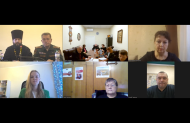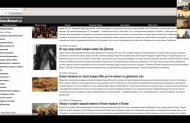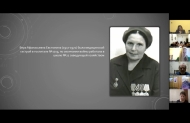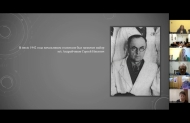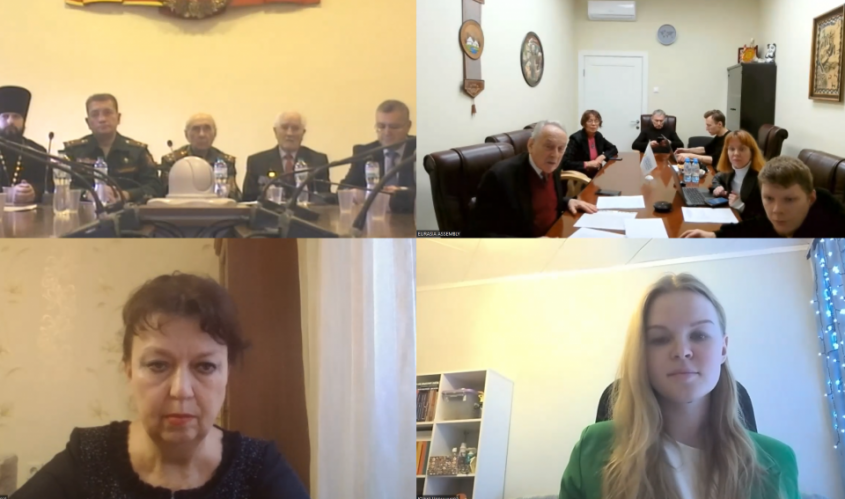
The Eurasian Peoples’ Assembly, together with its partner from the Pridnestrovian Moldavian Republic, the Cultural Center “My Orthodox Homeland,” held an International Public Forum for preserving the memory of the Second World War and the Great Patriotic War, dedicated to the work of evacuation hospitals. The platforms for dialogue were the Pridnestrovian State University (Tiraspol) and the headquarters of the Eurasian Peoples' Assembly in Moscow.
The organizations focused on the results of the research work of young people who search in the archives of their countries and collect information about the participants in the Great Patriotic War - the winners of fascism. The Forum was attended by students of the Taras Shevchenko Pridnestrovian State University, students of the Tiraspol Suvorov Military School, students of secondary schools in the cities of Tiraspol and Bendery of the Pridnestrovian Moldavian Republic. All of them are members of the public organization “My Orthodox Homeland” and they are engaged in archival and search activities. In the near future they will start search and archaeological excavations, which was supported by the Transnistrian Ministry of Education.
In Russia, the Forum was joined by participants of the Russian Search Movement and search teams from Perm and Sochi - cities that are known for a large concentration of hospitals during the Great Patriotic War. The Forum was attended by representatives of Kazakhstan, Belarus, the Republic of Moldova - public figures, teachers, professors who are actively engaged in educational and project work with students of higher and secondary educational institutions to preserve the historical memory of the peoples who defeated fascism.
Laila Akhmetova, professor at Al-Farabi University in Almaty (Kazakhstan), thanked the organizers for opening a new, very important and interesting historical topic - evacuation hospitals. Svetlana Sokolovskaya, teacher, head of the cultural center “My Orthodox Motherland” emphasized: “The study of the history of hospitals during the Second World War revealed unknown layers of the history of the First World War. This allows the study and archaeological work to begin.”
The Forum participants focused on the history of the combat route of Evacuation Hospital No. 1719, formed in Perm (then Molotov) in the first months of the Great Patriotic War. The hospital was opened on July 4, 1941 and passed through Minsk, Warsaw, Berlin, Kamenka, Saharna. The final point of deployment was the city of Tiraspol.
The uniqueness of this medical institution is that it is still functioning. The chief physician of the hospital, Dmitry Cholak, former Minister of Health of the PMR, spoke at the Forum. He talked about how the hospital works today, why in all areas of activity it is now important for Pridnestrovie to preserve the historical memory of the feat of medical workers.
Dmitry Fedorovich introduced the participants to Karp Sivunik, the head of the hospital in the post-war period, Honored Doctor of the MSSR, Knight of the Order of the Red Banner of Labor and the Order of Friendship of Peoples, the chief physician of the hospital from 1967 to 1996.
An employee of the Institute of Humanitarian Research of the Ural Branch of the Russian Academy of Sciences and the Perm State Archive of Socio-Political History, Yulia Chernysheva, presented specific information and statistics on all parameters of the hospital’s work in the city of Molotov. Another unique aspect of the history of Evacuation Hospital 1719 is the minimal number of deaths - less than 1 percent of the total number of patients, and this despite the fact that the hospital specialized in surgery.
Deputy Secretary General of the Eurasian Peoples' Assembly Valery Ruzin presented to the participants the media platform "Network of History" - a project of the Assembly, which, among other things, contains information about EH 1719. He presented the page of Major of the Medical Service Sergei Nikitovich Andreychikov, an outstanding psychiatrist who headed the hospital 1719 during the most difficult war period.
Also, on the dialogue platform, there was a piercing story about the amazing fate of a hospital patient - Soviet soldier Sergei Baranetsky. It was dedicated to the tragic and heroic fate of a man who did not break under the most difficult trials of life, who managed to start a family and survive, despite the echo of war. This story will also be posted on the History Network media platform.
As a result of the Forum, it was decided that the next research project “Twinning in Memory”, which is being conducted by the Eurasian Peoples’ Assembly, will be devoted to the topic of evacuation hospitals and will attract Forum participants, expanding the topic to all the republics of the former Soviet Union where people performed medical feats.



